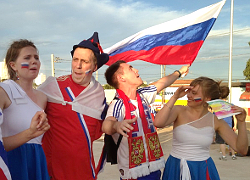Aleh Trusau: Russian centres in Brest and Homel are preparation for annexation
73- 25.06.2014, 14:38
- 48,679

The Belarusians criticise the opening of “Russian centres of science and culture” in the country.
One of them was opened in Brest. Speaker of Russia's State Duma Sergei Naryshkin and local officials attended the opening ceremony, which was widely covered by the local media, Radio Svaboda reports.
The Russian centre of science and culture in Brest is the first one in Belarus. However, another centre is expected to be opened in Homel. Initiators say similar institutions are founded in different countries of the world on a personal order of Vladimir Putin.
The opening of the centre raised concerns among public figures of Belarus. Wide-known architect from Brest Iryna Laurouskaya said the Russian centre would contribute to the Russification of Brest:
“I do not understand our local officials, who are careless enough to allow such pretentious ceremonies. We should remember that Brest is already russified. I don't know what lack of Russian culture the Russians mean. Everything is russified here. We can say about the expansion. I worry about it. I feel awful when I see girls wearing kokoshniks in Brest. I'd like to see our town multicultural, but it should be Belarusian first of all.”
Aleh Trusau, the head of the Belarusian Language Association, was more decisive. Centres of Russian culture are opened in Belarus only to “extend the borders of the 'Russian world' and prepare the annexation of Belarus,” he said about the opening of the centre in Brest.
Trusau thinks the imperial culture “is being dragged into Belarus through television, the church and such centres”. It is happening at the time when the Belarusians don't know well their own culture or the democratic culture of Russia.
Opening centres of Russian culture is one of the tools to form the “positive image of Russia abroad”. A special institution Rossotrudnichestvo was created in Russia for these purposes. President Vladimir Putin officially called it a “soft power” tool, according to Kommersant.
Rossotrudnichestvo receives almost 9.5 billion Russian rubles from the state funds. Its budget was increased 4.5-fold following a special order of Vladimir Putin.
Russian experts call Rossotrudnichestvo an analogue of the United States Agency for International Development (USAID). Certain remarks by Rossotrudnichestvo's head Konstantin Kosachev allow concluding that he regards the activity of the organistion as a part of the ideological war for influence.
A high-profile scandal involving Rossotrudnichestvo relates to the US. Yury Zaitsev, the head of the Washington department, was suspected by the FBI of espionage and recruiting American citizens.
Kosachev welcomes the opening of the Centre of Russian culture in Brest, which became the 60th centre: “This centre opens the principally new state of our work. Our priority is the CIS area, where we move further than demonstrating flags in the capitals to the real routine work on the humanitarian space that unites our countries and nations,” he said.
Besides competitions for teachers and publishing books of Russian and Belarusian poetry, Rossotrudnichestvo actively supports pro-Russian organisations of all kinds. The website of the Russian embassy in Belarus contains a banner of the website Together with Russia. A special resolution signed by head of the public association Russian Home Andrei Gerashchenko was issued to thank Rossotrudnichestvo.
Rossotrudnichestvo also supports pro-Russian ultra-nationalists organisation Rus Molodaya. It is Rossotrudnichestvo that became an organisational partner of the nationalist bench press tournament, which was held in Minsk in May and caused a conflict with the ultras of football club Partizan.








